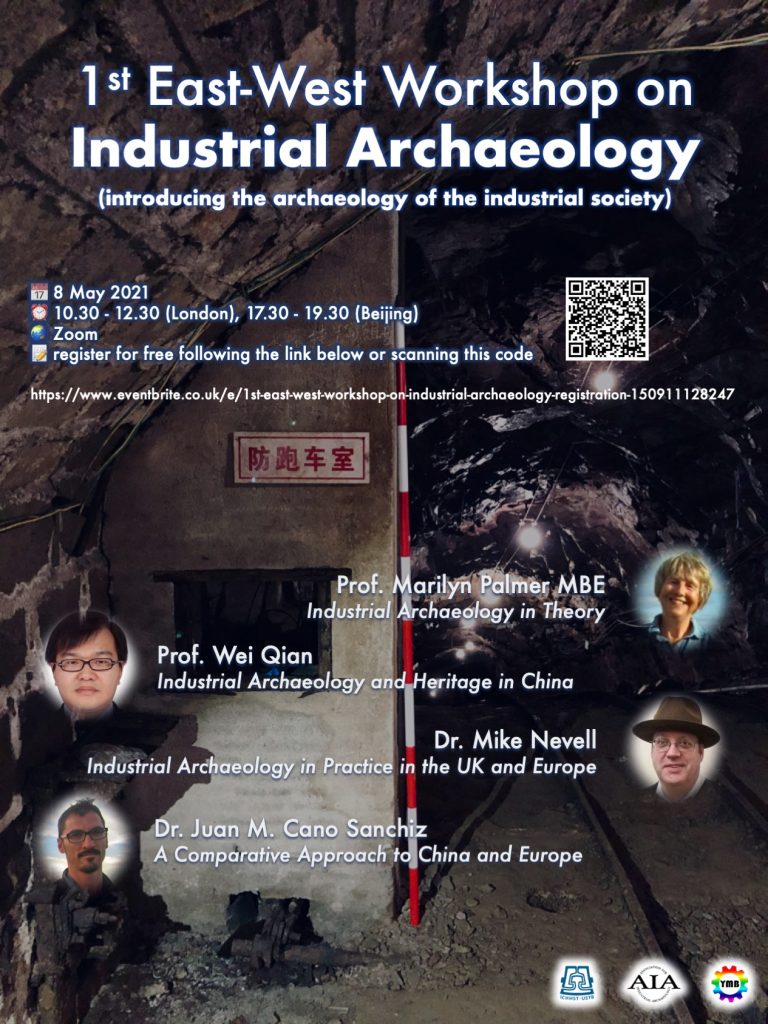The East-West Workshops on Industrial Archaeology aim to exchange ideas and knowledge among Western and Eastern colleagues to build a more international and diverse industrial archaeology.
The workshops are organised jointly by the Institute for Cultural Heritage and History of Science & Technology (USTB, China) and the UK Association for Industrial Archaeology.
It is planned to hold two workshop events each year, in the (Northern Hemisphere) Spring and Autumn.
Recordings of earlier workshops are available on the AIA YouTube channel
Full written reports of the workshops are available in IA News
The ninth edition of the East-West Workshop was held on the 15th November 2025. The speakers were:
– Yibing FANG (Chinese Academy of Sciences, China): “A Review of Research on China’s Early Steel Rails Heritage“
– Paulina ROMANOWICZ (Polish Academy of Sciences, Poland): “Rediscovery of a Brickworks Narrow-Gauge Industrial Railway Tunnel in Stołczyn, Poland“
– Arida Fitriana YASMIN (University of Groningen, Netherlands): “Follow the Tracks: Railway Heritage Management at the Ombilin Coal Mining Heritage of Sawahlunto, Indonesia“
– Juan Manuel CANO SANCHIZ (University of Science and Technology Beijing, China / Association for Industrial Archaeology, UK): “European Early Railway Architecture in Beijing: A Perspective from Building Archaeology“
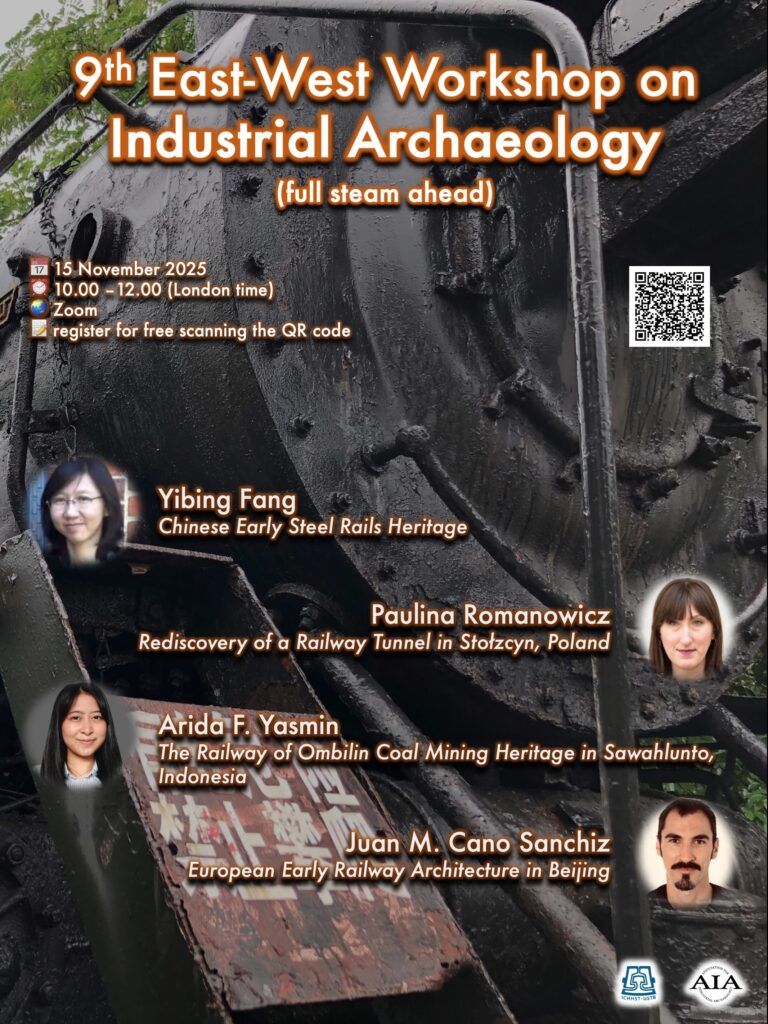
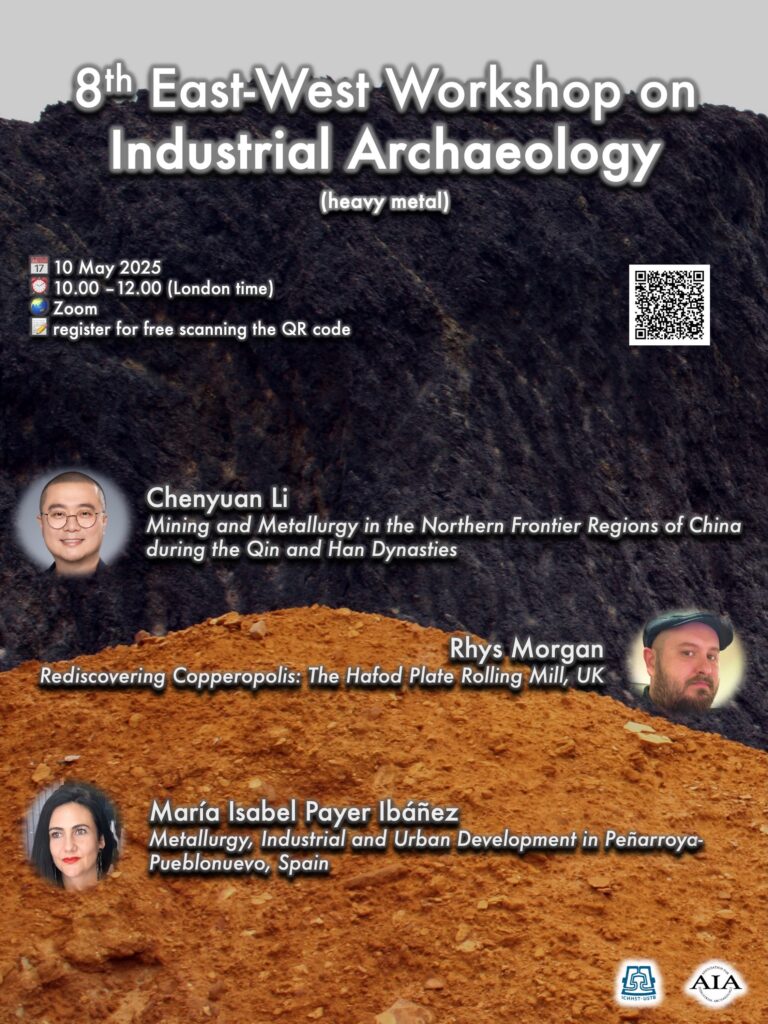
The eighth edition of the East-West Workshop will be held on Saturday 10th May 2025, 10:00 – 12:00 London time. The speakers will be:
Chenyuan LI (University of Science and Technology Beijing, China): “The Evolution of Mining and Metallurgical Production Technologies in the Northern Frontier Regions of China during the Qin and Han Dynasties: A Perspective from Archaeometallurgy”
Rhys MORGAN (Black Mountains Archaeology, Britain): “Rediscovering Copperopolis: The Hafod Plate Rolling Mill, Swansea”
María Isabel PAYER IBÁÑEZ (Prayer Arquitectura / University of Seville, Spain): “Metallurgy as Industrial and Urban Development in Peñarroya-Pueblonuevo, Spain”
Zoom (online meeting). More info and free registration:
The seventh edition of the East-West Workshop was held on the 23th November 2024. The speakers were:
Yiping DONG (Xi’an Jiaotong-Liverpool University, China)
“Complexity of the Conservation of Textile Heritage in China”
Ian MILLER (The University of Salford, Britain)
“Salford Twist Mill: Uncovering an Iconic Textile Factory”
Mark WATSON (Historic Environment Scotland, Britain)
“Global Textile Industries and their Built Heritage”
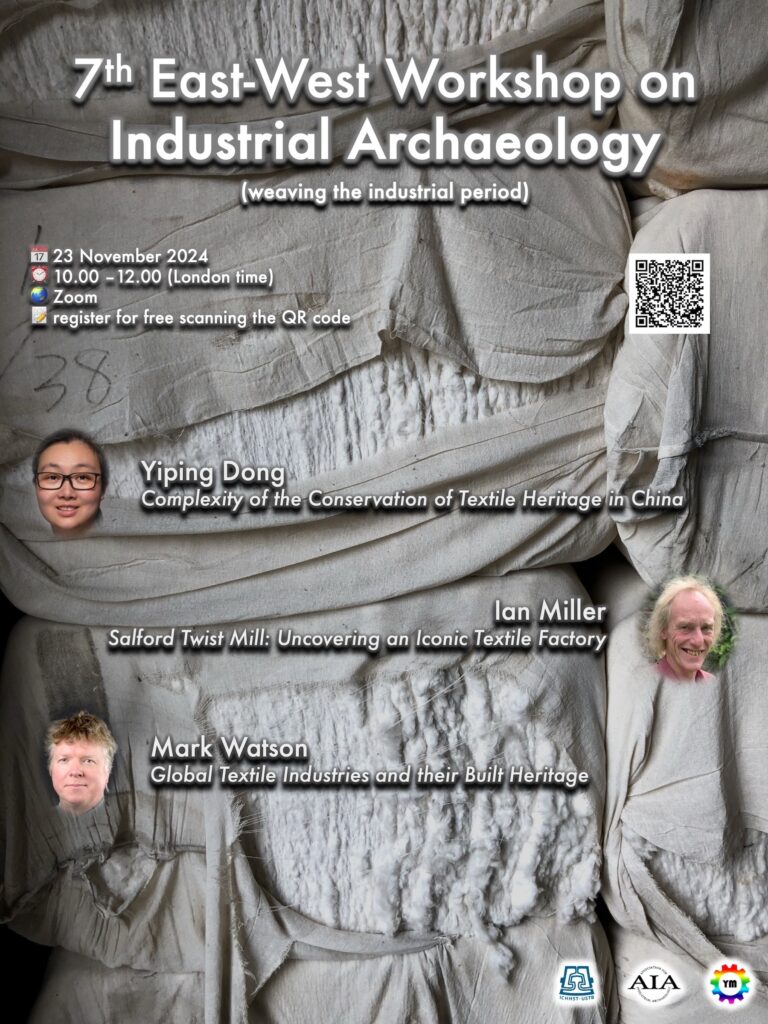
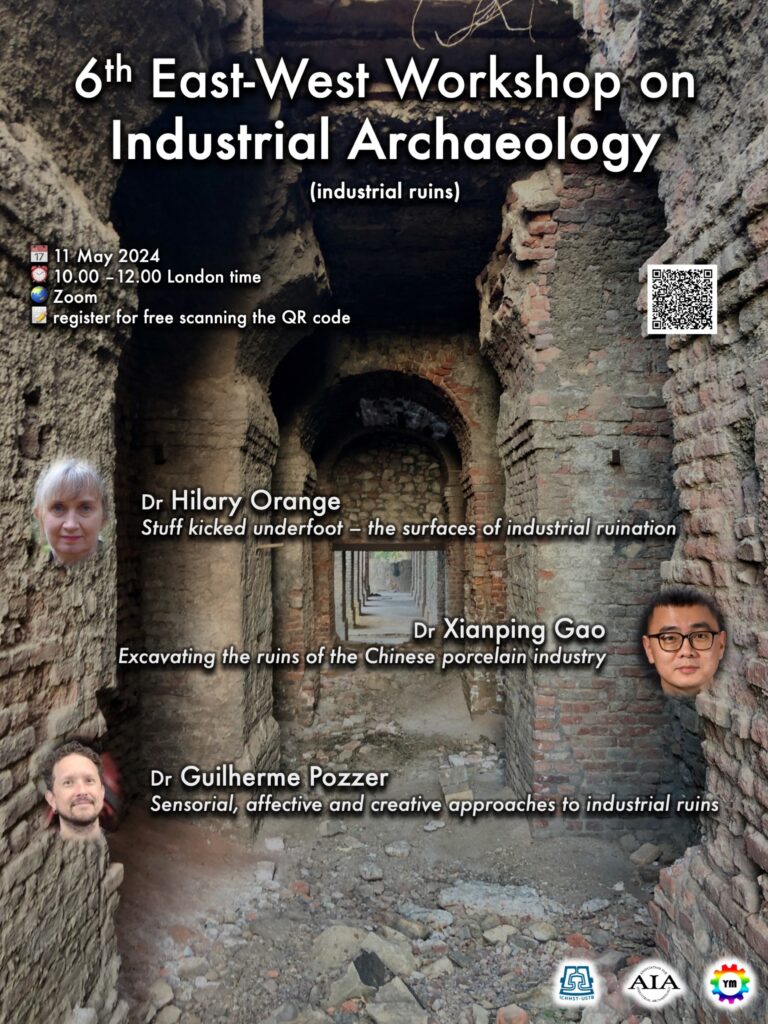
The sixth edition of the East-West Workshop was held on the 11th May 2024. The speakers were:
Hilary ORANGE (Swansea University, Wales)
“Stuff Kicked Underfoot – The Surfaces of Industrial Ruination”
Xianping GAO (University of Science and Technology Beijing, China)
“Excavating the Ruins of the Chinese Porcelain Industry: The Luomachiao Kiln Site in Jingdezhen “
Guilherme POZZER (University of Sheffield, England)
“Words in Ruins: Sensorial, Affective and Creative Approaches to the Ruins of Industry”
The fifth edition of the East-West Workshop was held on the 25th November 2023. The speakers were:
Carolina CASTAÑEDA (TICCIH-International and TICCIH-Spain)
“The imprint of the Spanish tobacco industry on the urban landscape: Permanences and absences of an industrial memory
Fanlei MENG (Beijing University of Civil Engineering and Architecture, China)
“Research on the history and architectural heritage value of industrial construction in modern Beijing”
Gordon DAVIES (Cambridge Museum of Technology, England)
“An industrial tale of two cities: Filming the architecture of industry around Cambridge Museum of Technology (UK) and Athens Technopolis (Hellas)“
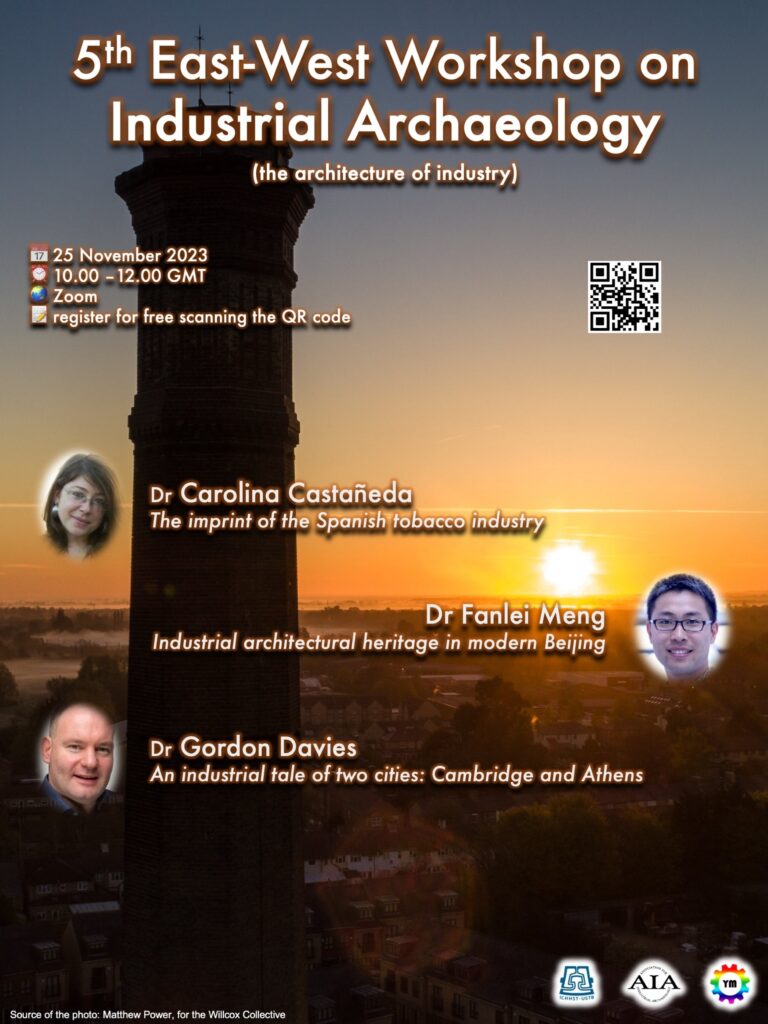
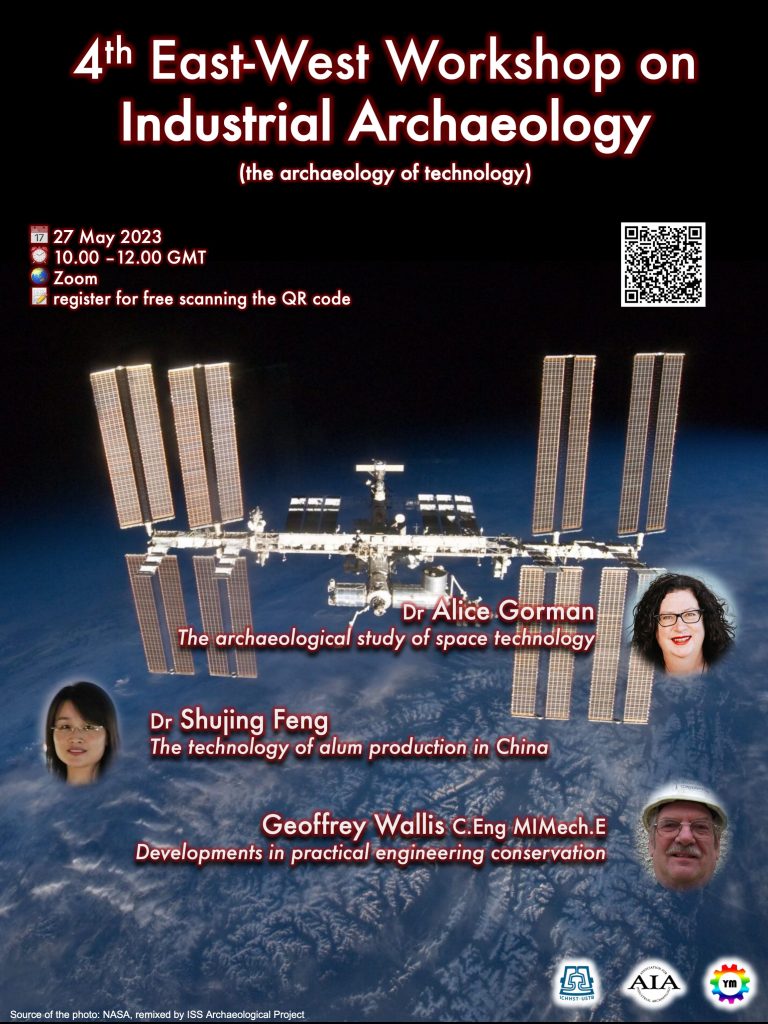
The fourth edition of the East-West Workshop was held on the 27th May 2023. The speakers were:
Alice Gorman (Flinders University, Australia)
“Beyond the rocket: the archaeological study of space technology”
Shujing Feng (National Academy of Innovation Strategy & Tsinghua University, China)
“Wenzhou Alum Mine from the perspective of the archaeology of technology”
Geoffrey Wallis (GW Conservation/Dorothea Restorations & AIA, UK)
“Developments in practical engineering conservation. The works of Dorothea Restorations Ltd.”
The third edition of the East-West Workshop was held on the 19th November 2022. The speakers were:
Dongdong WANG (University of Science and Technology Beijing, China)
“Discussion and interpretation of mining and metallurgical cultural heritage in Chinese museums”
Florentina-Cristina MERCIU (University of Bucharest, Romania)
“Diversity in approaching proto-industrial heritage. The water mills from Rudăria area (Romania) as a case study”
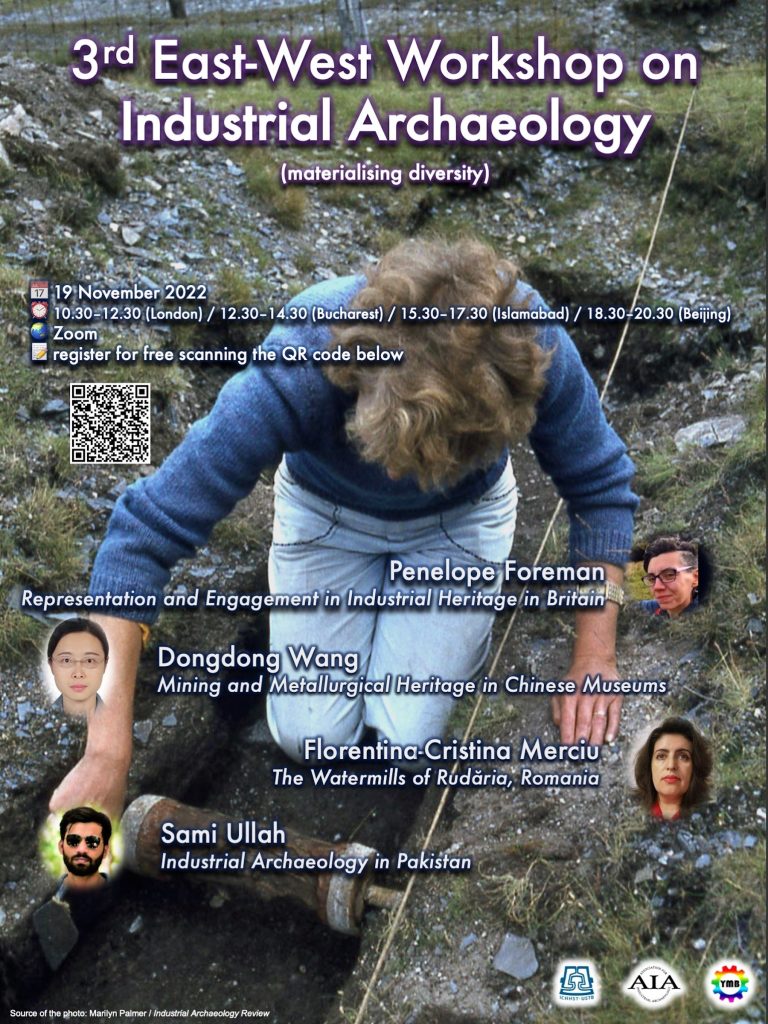
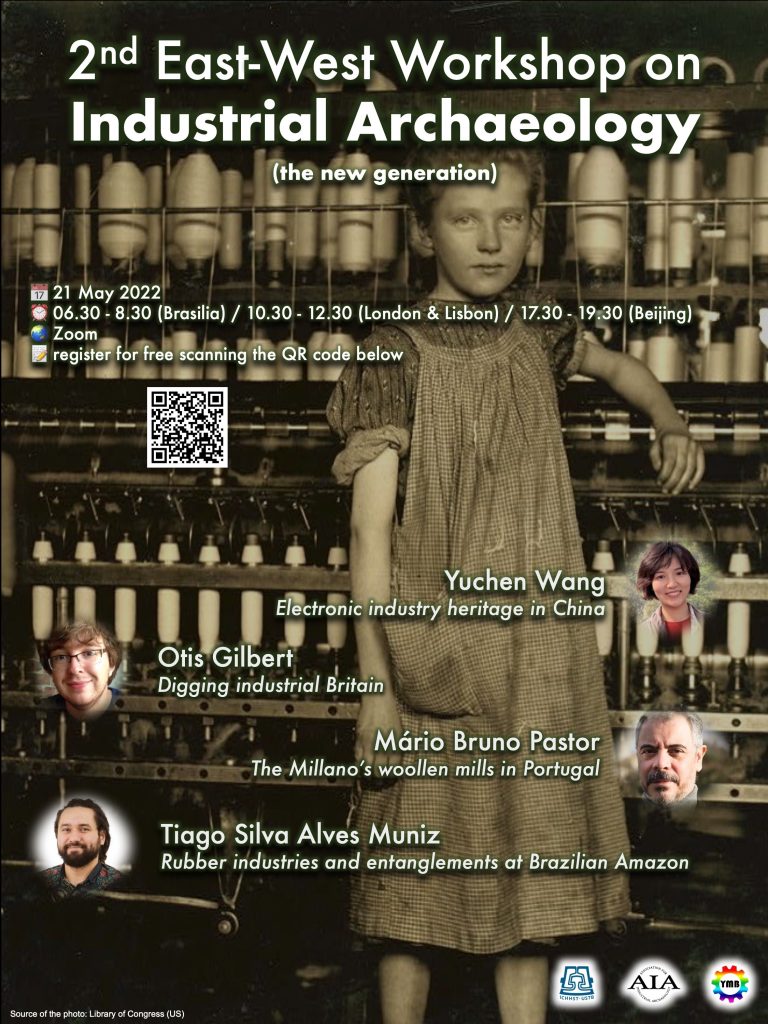
The second East-West Workshop was held on 21st May 2022. The speakers were:
- Yuchen Wang (University of Science and Technology Beijing) who spoke on: “Electronic industry heritage: the example of the Chinese display industry”
- Otis Gilbert (Wessex Archaeology) who spoke on: “Digging industrial Britain: two case studies from Sheffield and Normanton”
- Mário Bruno Pastor (Portuguese Catholic University) who spoke on “The Millano’s woollen mills in Portugal: an archaeology of absence”
- Tiago Silva Alves Muniz (Federal University of Pará) who spoke on: “The rubber industrial complex and entanglements in the Brazilian Amazon”
The first East-West Workshop was held on 8th May 2021. The speakers were:
- Professor Marilyn Palmer (President of the Association for Industrial Archaeology) who spoke on: “Industrial Archaeology in Theory”
- Dr. Mike Nevell (Industrial Heritage Support Officer for England) who spoke on: “Industrial Archaeology in Practice in the UK and Europe”
- Professor Wei Qian (Dean of the Institute for Cultural Heritage and History of Science and Technology, USTB) who spoke on: “Industrial Archaeology and Heritage in China: A General Overview”
- Dr. Juan M. Cano Sanchiz (Associate Professor at the ICHHST. Internationalisation officer for the YMB-AIA) who spoke one: “A Comparative Approach to China and Europe: Differences, Common Points and Potential Lines of Collaboration”
